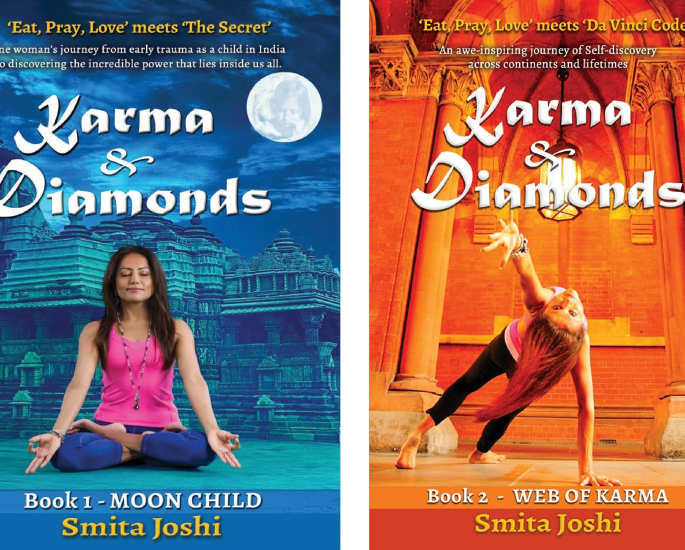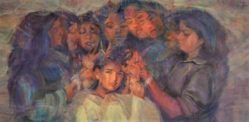Through her life, we begin to examine our own
Author Smita Joshi cleverly marries her experiences and spirituality to tell her engaging life story, offering an insightful perspective on familiar philosophical principles.
Covering the formative early and traumatic events in Gujarat and then her family’s settlement in London, Moon Child is the first installment from the Karma & Diamonds trilogy.
In this book, Smita offers an interesting exploration of how your inner Self can help you navigate life’s challenges.
Moon Child, sets the scene for the trilogy.
It focuses on the blossoming of a sensitive and empathetic young girl in a traditional and complex family.
We then follow Smita across the world as she blossoms into an ambitious yet still introspective adult.
Atman, the inner Self, may be a familiar concept to some. Smita introduces us to this concept early in the novel.
Her simple, yet evocative writing explains how she comes to trust in this idea in dream-like encounters with Hindu idols.
In particular, we see her vivid out-of-body encounters with the white swan of Goddess Saraswati.
These meetings support Smita through her travails including a mother suffering from mental illness, a prospective marriage, and balancing traditional expectations with western culture.
Indeed, she fascinatingly highlights how this inner Self can be at odds with the expectations of Indian society.
For instance, she rejects a marriage with her first love to be true to her inner Self.
It guides her to instead chase the spark of fulfillment that she has discovered in her skyrocketing professional success.
Here, Smita recounts a relatable experience for all, regardless of background.
Many have faced the choice between the logical and safe option or risking it all on a gut instinct.
It takes real courage to decide on the path less trodden and the reader can’t help but want to find out the results of Smita’s risky decision.
A Look into Spirituality

Throughout Moon Child, Smita Joshi comes to several similar crossroads.
This autobiographical tale will certainly resonate with those who are experiencing the same crises in life.
Whether it’s the loss or breaking from tradition, it’s often hard to find guidance you can trust.
Alongside sharing her interesting experience, Smita discusses principles familiar to those who practice Hinduism.
However, there’s room for others to appreciate her philosophy and this could offer an alternative to readers looking for help in their own lives.
While it comes relatively close to the end of this first book, an insightful conversation between Smita and her work friend-cum-best friend, Gina, highlights the adaptability of her ideas.
Their chat allows all to appreciate the universal appeal of Smita’s efforts to shed her veils of illusion.
In their conversation, Gina’s professional background introduces western psychology such as Carl Jung to Smita’s own feelings.
This blends nicely with Smita’s ideas on the concept of ‘closure’ with karmic resolution.
Indeed thanks to this, she shows how philosophical or theological concepts don’t have to remain in books.
Rather they can help guide you and encourage you to overcome obstacles such as the pain of ignoring past trauma.
A Life Story

Moon Child does suffer from Smita’s intensely chronological narrative at times.
Sudden and big time jumps can often leave the reader feeling disorientated and break concentration.
This can make her narrative seem disjointed whereas, at other times, she manages to maintain a logical flow.
Still, she does well to emphasise her growing maturity over her life journey.
We sympathise with her girlish need to seek love and approval, which helps us understand how the later loss of her main maternal figure sends her reeling.
Nonetheless, after painful childhood problems with her birth mother and family, we see how she attempts to approach this second loss more sensibly and empathetically.
A clear strength of the book is Smita’s capacity to reflect, change and grow as a person.
In spite of her professional success, this is perhaps her main admirable quality and encourages us to consider her perspective and approach.
She doesn’t use her philosophies to assume a sense of superiority and instead humbly tries to understand others.
Indeed many can learn a lesson from Moon Child to acknowledge a personal gut reaction, but ultimately work to understand the valid reasons behind the decision of another’s.
Similarly, we often look at changes in our lives as endings, whereas Smita Joshi shows how these can be exciting beginnings.
In a way, Moon Child takes Smita’s life story to create a less preachy version of the self help novel.
Through her life, we begin to examine our own, in a manner that is more kindly than cruel.
Nevertheless, the book isn’t without fault. It’s curious that some of the effects of Smita’s changes aren’t mentioned.
When her relationship with her secondary maternal figure evolves, there isn’t an explanation of how they now interact.
Similarly, the lives of the other cast of characters feel unresolved in Book One.
Of course, there may be reasons for this: the book is the first of a trilogy, it’s an autobiography, and the need to focus on the main concept of the book.
Still, as a reader, this is frustrating.
Smita Joshi and Her Audience

Finally, many British Asians will surely relate to her efforts to balance her appreciation of her family bonds with her growing western ideals.
Even the thought of buying her own flat is fraught with complications and the fear of upsetting elders.
It’s almost funny to see the familiar struggle of negotiating familial worries with the need for independence.
In fact, even today Smita Joshi is somewhat of an aspirational figure with her career success.
Even when she struggles, we can admire her common sense approach.
Unfortunately, her writing can be overly simplistic at times. While this suits the voice of her younger self, it can jar with her older adult mind.
The ending of the book is a punchy one, if sudden.
It’s no secret that Smita goes to spend time in the ashrams of India, but the reasons behind her decision are interesting.
Here, it’s most clear why her book has drawn comparisons to Elizabeth Gilbert’s Eat, Pray, Love. However, as a warning, this may not be to everyone’s taste.
Overall, the book as a whole does require an open mind.
While it might not merit a reread, the book can be a fruitful reading experience.
Smita mentions familiar techniques like meditation and science has proven the benefits of this.
Spirituality can be a controversial topic but Smita’s kindness and her uplifting approach to difficult events make her incredibly likeable.
Even the most sceptical reader will find something to admire.
Grab your own copy of Moon Child here.






























































